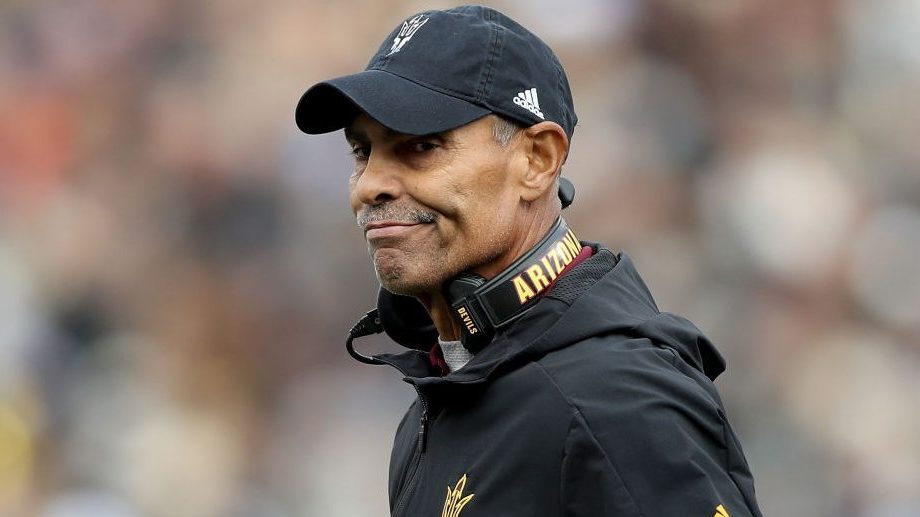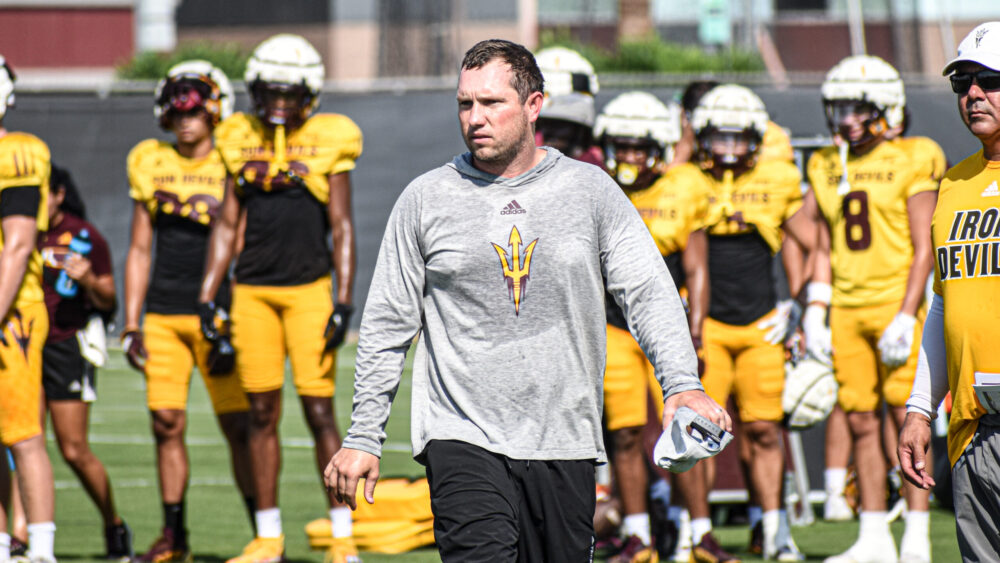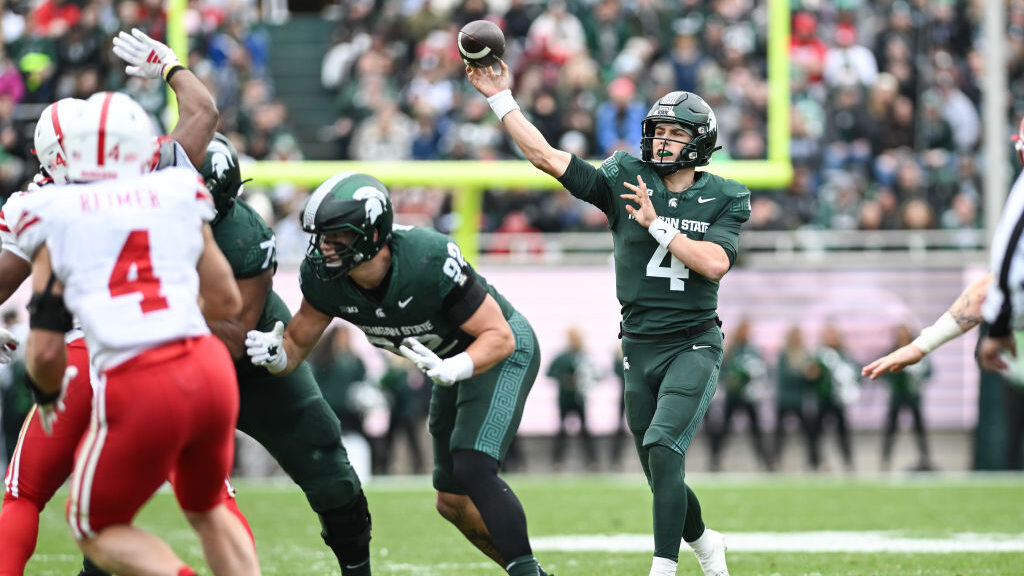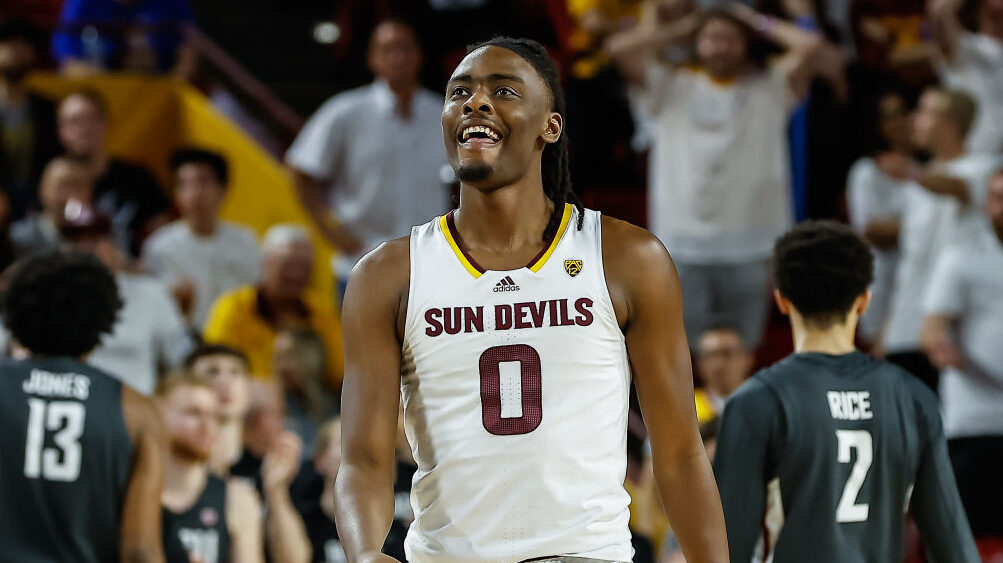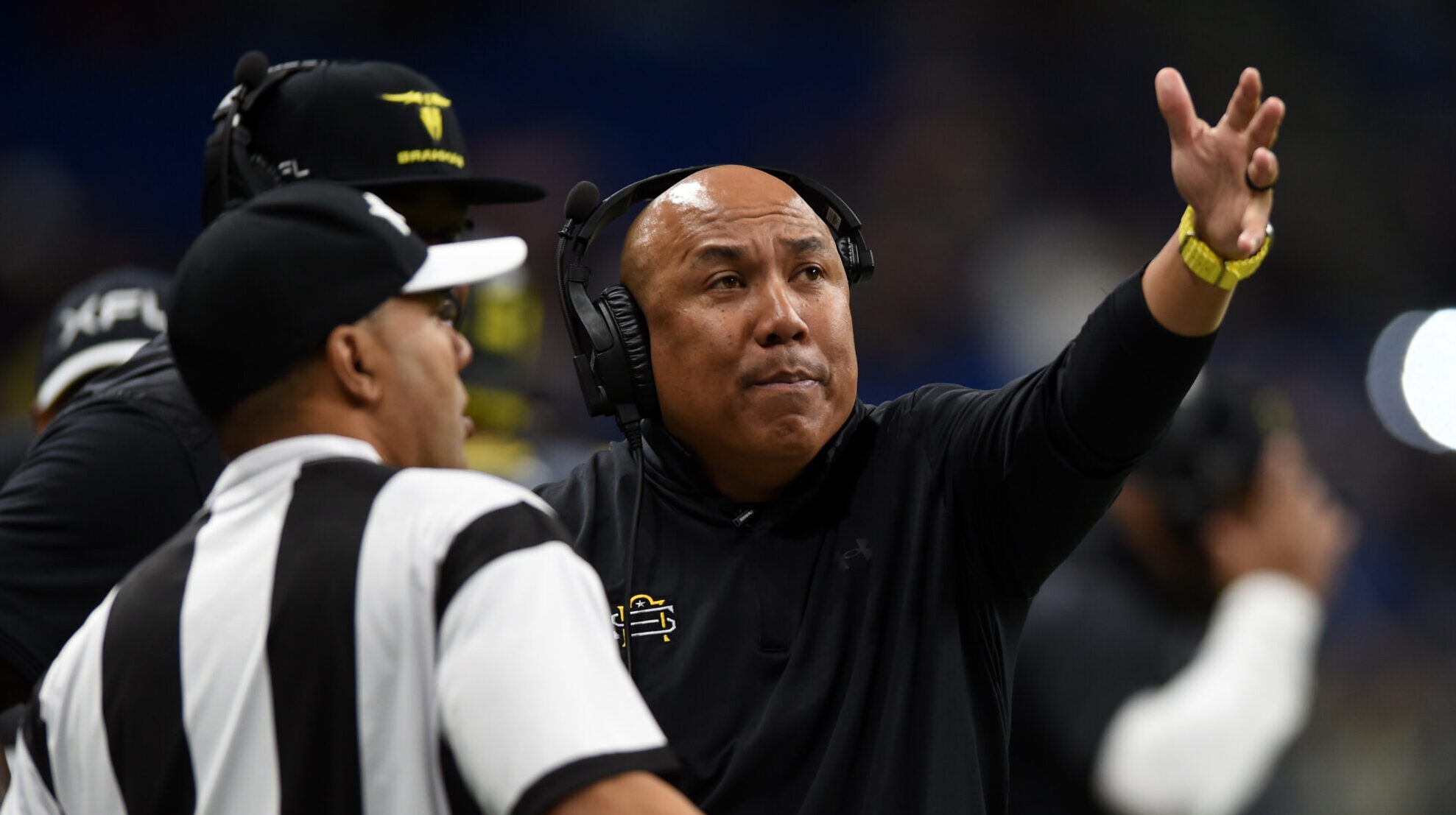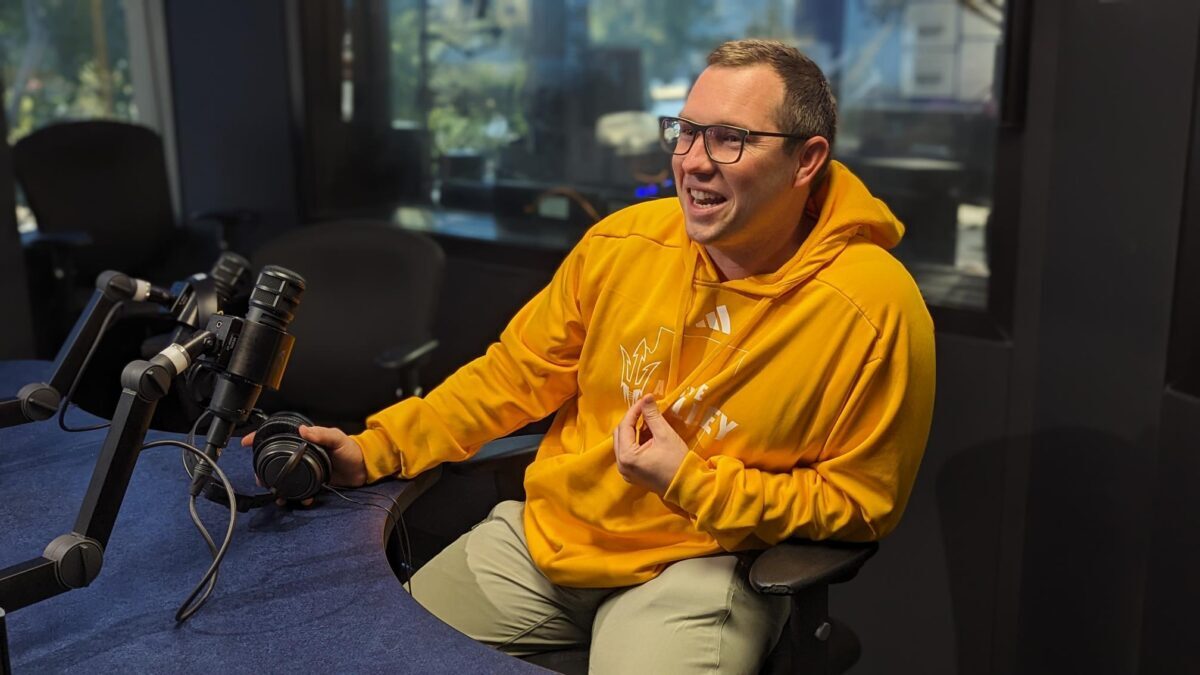Ray Anderson’s 3-year ASU tenure marked by sweeping changes
Jan 9, 2017, 7:09 AM | Updated: Jan 13, 2017, 7:59 am
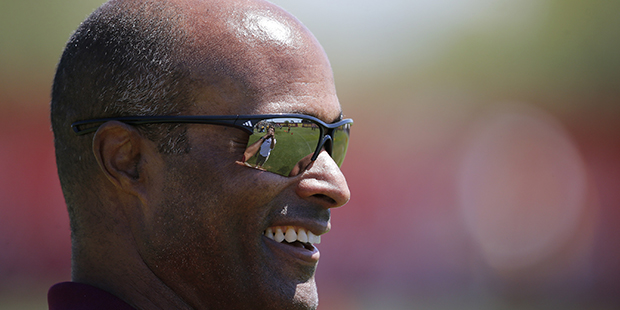
Arizona State's athletics director Ray Anderson smiles as he watches the Arizona State spring NCAA college football game Saturday, April 16, 2016, in Tempe, Ariz. (AP Photo/Ross D. Franklin)
(AP Photo/Ross D. Franklin)
TEMPE, Ariz. — Ray Anderson never pauses his thought as he rises to close the arcadia door dividing his corner office at the Carson Student-Athlete Center from the clatter of construction at Sun Devil Stadium. Arizona State’s Vice President for University Athletics is used to multi-tasking; adept at drowning out noise.
“I’m feeling even more invigorated than I ever could have imagined coming into this job,” said Anderson, who was hired three years ago today. “There’s never a dull moment because we’ve got so many things happening all the time. Frankly, it’s the pace that I enjoy. I don’t like routine at all.”
There is nothing routine about the direction of Sun Devil Athletics, and with a dizzying array of projects, hires and achievements, Anderson has already carved his indelible signature on the face of the department.
In three short years…
• He has overseen the previously priced $268 million renovation of Sun Devil Stadium, whose price tag may rise with additional upgrades expected for the delayed final phase on the east side of the stadium.
• Shepherded the relocation of the baseball team from obsolete Packard Stadium to Phoenix Municipal Stadium, with a relocation of ASU’s golf teams to Papago Golf Course also in the works.
• Hired 16 new varsity coaches, including marquee hires Bobby Hurley (men’s basketball) Bob Bowman (swimming), Zeke Jones (wrestling) and Cliff English, who won the national championship in his first year as coach of women’s triathlon.
• Negotiated an eight-year, $38 million apparel agreement with Adidas, moving the school away from the Nike brand.
• Taken the department’s multi-media rights out of the hands of IMG and brought them in-house.
• Matched football coach Todd Graham in donating $500,000 with his wife, Buffie, to Sun Devil Athletics Momentum, a fundraising effort for the football stadium renovation.
• Added a donation of $1 million to the $4 million that Adidas fronted to restart the men’s tennis program and build a new tennis facility.
• Help convince the Intercollegiate Tennis Association to relocate its headquarters from Princeton, New Jersey to Tempe.
• Was named to the board of directors for the Green Sports Alliance, which leverages the market influence of sports to promote environmentally sustainable practices.
• Overseen the school’s master plan for an athletic district that will finance the department’s capital projects (Anderson keeps a map of the district in his office on which he loves to project his dreams).
• Announced an exclusive negotiation agreement between the Coyotes and Catellus Development Corp., ASU’s athletic facilities district developer, to work towards the finalization of a commercial development project within the district along Tempe Town Lake and build two new arenas that would house the Coyotes and ASU hockey.
• Added four varsity sports: men’s hockey, women’s lacrosse and triathlon, and men’s tennis.
• Oversaw an athletic department that recorded an all-time high 87 percent graduation success rate (GSR) for its student-athletes in 2016, placing ASU second in the Pac-12 behind Stanford.
“I think the thing we are most proud of is that in an environment where most schools are finding reasons to cut varsity programs or resisting adding them because it takes resources, commitment and will, we’ve actually added four programs and added academic assistance through scholarships — and we’re not done yet,” Anderson said. “I’m one who benefitted greatly from the student-athlete experience. The best thing I ever did in my life was play varsity sports and go to school.”
Anderson knows some critics wonder why he pays so much attention to Olympic sports when the cash cows of the department, football and men’s basketball, have struggled to establish consistent success. It’s an opinion he calls shortsighted.
“If that criticism means keep pouring money into football to the detriment of other sports, I would say that those critics don’t share our commitment that every sport is important — that Olympic sports are important,” he said.
“We are making significant investments in football as indicated by this pretty terrific reinvention of Sun Devil Stadium, and we are investing in salaries and in coaches and in upgrading programs, but I believe that the student-athlete experience is an educational experience and a leadership development experience. We’re in the leadership development business so the more student-athletes we can put in the position of competing academically, athletically and in terms of their social advancement, the more we can produce leaders that go out into our community and make a positive impact. Frankly, I struggle with those who fail to see that.”
The hockey program was born from a $32 million donation, the largest in Sun Devils Athletics history, but Anderson said ASU President Michael Crow’s vision for, and commitment to public and private partnerships is what’s fueling the department’s expansion.
“You have to have the confidence to be able to go out and financially support your case, and we’ve been able to do that,” Anderson said. “We didn’t just add a sport and then say ‘oh, by the way, how do we figure out how to support it financially?’ The last thing you want to do is start a sport and then unplug it. That’s a real disservice.
“I’ve only had a pause when we couldn’t make the case that we have the finances to support it for 13-15 years — which is part of our business model that if you don’t go out and raise another dime for that sport you can still sustain it for 13-15 years. With regard to fund-raising and philanthropy and revenue generation, we have a real good sense that we will be able to do it successfully in those sports and wherever else we might add.”
Anderson understands these decisions are still fraught with risk, but it’s a path he learned to navigate a long time ago when his father died suddenly while Ray was 9.
“The death of my father taught me very early that if I got out there and worked and demonstrated a commitment to doing something, there would be a lot of folks out there prepared to help me,” he said. “That’s why I was always able to work at Mr. Miller’s gas station during high school. In junior high school, I could always work at the nursery picking weeds. I knew I could always get a job at the parks and recreation department picking up trash and cleaning up parks. As I started getting recruited for college, it became very clear to me that there were a couple of alums who knew my story and they wanted to help me. If I needed help to go to a summer session in Italy when I was at Stanford, I could do that, and I like to think I earned that right to be assisted.”
Comfort with risk is what led Anderson to abandon a partnership track at a law firm and take a 50 percent pay cut to become a sports agent, and eventually start his own agency.
“Buffy thought I was a little crazy,” he said, laughing, “but I was never really afraid of failure; afraid to try something different.”
Anderson knows that his predecessors used ASU as a stepping-stone to bigger programs. Gene Smith left ASU to become Ohio State’s AD in 2005. Steve Patterson left ASU for Texas late in 2013. He knows that his past suggests an inevitable restlessness; an eventual need for new challenges. But Anderson has rolled up his sleeves to alter that perception of ASU, and the demands of the job are all consuming.
“I’m not getting restless because I don’t have time to get restless,” he said. “That’s been a fun part of the first three years and there’s a lot more work to be done.”

